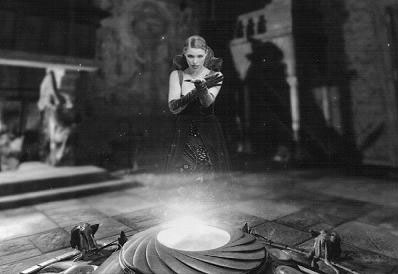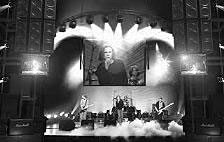| The Devil went down to Wales | ||
| Haunted Castle (3-D Large Format) | ||
 |
||
| Review by Ross Anthony | ||
|
A hovering helicopter-view carries our collective perspective around a computer-generated castle off the cliff-laden coast of some British Isle. The sky, orange and smoky; the water, foam-laced. Johnny, called from the grave by his long estranged rock-star mom ("All I knew about her was from the tabloids."), enters his newly inherited creepy castle. About 90% of the time we view Johnny's tour through his eyes. The other 10% the cam flies wide so we can actually see Johnny who is played by Jasper Steverlinck, lead singer of alternative rock band Arid. Though mostly singing this genre, his dabbling in opera vocals brings down the house. Very quickly we realize along with Johnny, that he's been summoned to make a deal with the devil - his soul in exchange for infinite rockstar famedom. "Haunted Castle" is a virtual "Haunted House." Something you might pay three to ten bucks to check out in the neighborhood, but with less creepy ghouls. Hampered by less than impressive 3-D, these knightless coats of armor, gargoyles, and skeletons just don't jump off the screen, nor are they all that eerie. Another problem is the timing/speed of motion - a huge factor in making a scary movie scary. Besides obviously being computer recreations, these figures just don't move like real things, therefore we don't fear them. Lastly, a chamber of torture scene (which prompted the IMAX corp. to strongly discourage play of this reel to theaters in its association) offers nothing grosser than those combat video games assuredly available in the halls and lobbies of those same theaters. I did enjoy the imaginative use of a picture frame, which revolves around each torture rack and table through which we observe the vile act intermittently. But though the acts sound scary on paper (electrocution, acid dipping, decapitation), the actual executions (pardon the pun) are less frightening than, say, stepping on an ant. This is because the victims are so obviously not real, the electricity does not come off screen, the knife doesn't look sharp or feel heavy, and the acid tank looks like a fish bowl. The film breaks into a "roller coaster" type ride at three separate points. These are the moments that really create the sense of disorientation, of vulnerability, and tantalizing dangerous excitement that ought have dominated the experience. The amusement park car on a cable tunnels through the dungeons and castle basements into "hell" (well, some fiery place anyway). The jerky movement and coordinated industrial sounds meld with the visual trek masterfully, making you nearly feel that you are actually boarding a Ferris wheel rolling through a sea of fire. I especially enjoyed the collision of "our" car with another misguided car. The general exploratory journey is paused only for two or three moments of exposition from Mr. D (the devil I presume) and his right hand Al Bundy-like demon. The exposition could have been a bit shorter, though a few biting lines were worth the delay, "When you're dealing with damned souls, space is always a problem." The journey also pauses for an eerie Indian-rock fused jabberwocky song by the spirit of Johnny's mom (Kyoko Baertsoen, lead singer for Lunascape). The camera slowly orbits the singer as she charms like a snake from a basket. I found this scene engaging primarily because I enjoyed the music, but with a 2 minute uncut shot ... nothing MTV would ever air. Since the only two "real" people in the production are musicians, one hall of the castle briefly floats stringed instruments out to the audience from lute to Strat, a history is implied. A similar pattern is used for horns. Though, the didjeridu produced an appropriately haunting call, these scenes added little to the chill. A note on dialogue: The production is mostly
filmed in first person so that we Lastly, the film credits roll (or I should say, float in bubbles) over an ending long cut of the band Arid rocking. A video 3-D screen is placed over a static wide shot. Fair enough, but coverage begged for more 3-D camera movement on stage and larger use of the large format. Unfortunately the censorship controversy may be the most memorable part of the film. (See: Interview with Ben Stassen). Still, I loved Ben's earlier piece "Encounter in the Third Dimension," and eagerly await his next creations. |
||
|
|
||
|
||
Grade..........................B- |
||
Copyright © 2001. Ross Anthony, currently based in Los Angeles, has scripted and shot documentaries, music videos, and shorts in 35 countries across North America, Europe, Africa and Asia. For more reviews visit: RossAnthony.com |
||
|
 can
pretend to be Johnny turning each corner and opening
each door. We are placed into the castle. But
Johnny's off-screen mumblings only serve to distract
from that mediation. Phrases like, "What do you want
from me?" or "What the?" or "Little help here
please." Or "What's going on?" are too
"Scooby-doo."
can
pretend to be Johnny turning each corner and opening
each door. We are placed into the castle. But
Johnny's off-screen mumblings only serve to distract
from that mediation. Phrases like, "What do you want
from me?" or "What the?" or "Little help here
please." Or "What's going on?" are too
"Scooby-doo."




